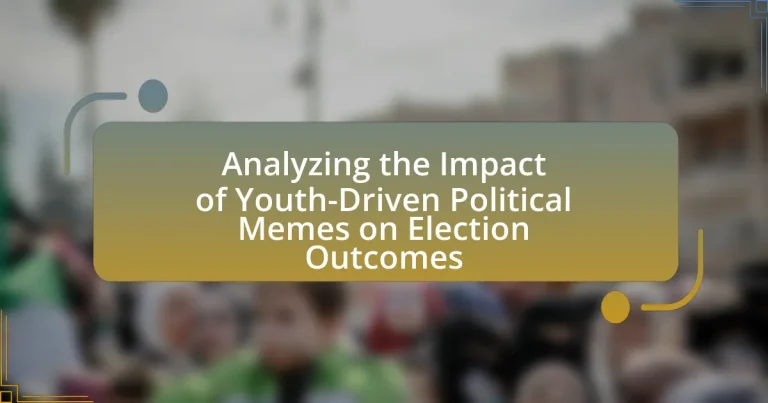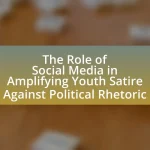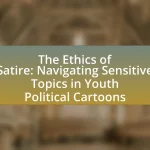The article analyzes the impact of youth-driven political memes on election outcomes, highlighting their role in shaping political discourse and influencing voter engagement among younger demographics. It discusses how these memes simplify complex political issues, resonate with youth values, and mobilize support for social justice, climate change, and anti-establishment sentiments. The article also examines the effectiveness of memes as a medium for political communication, their influence on voter behavior, and the implications of meme culture on traditional media narratives. Additionally, it explores future trends in meme usage during elections and offers strategies for political organizations to engage youth effectively through relatable and authentic meme content.
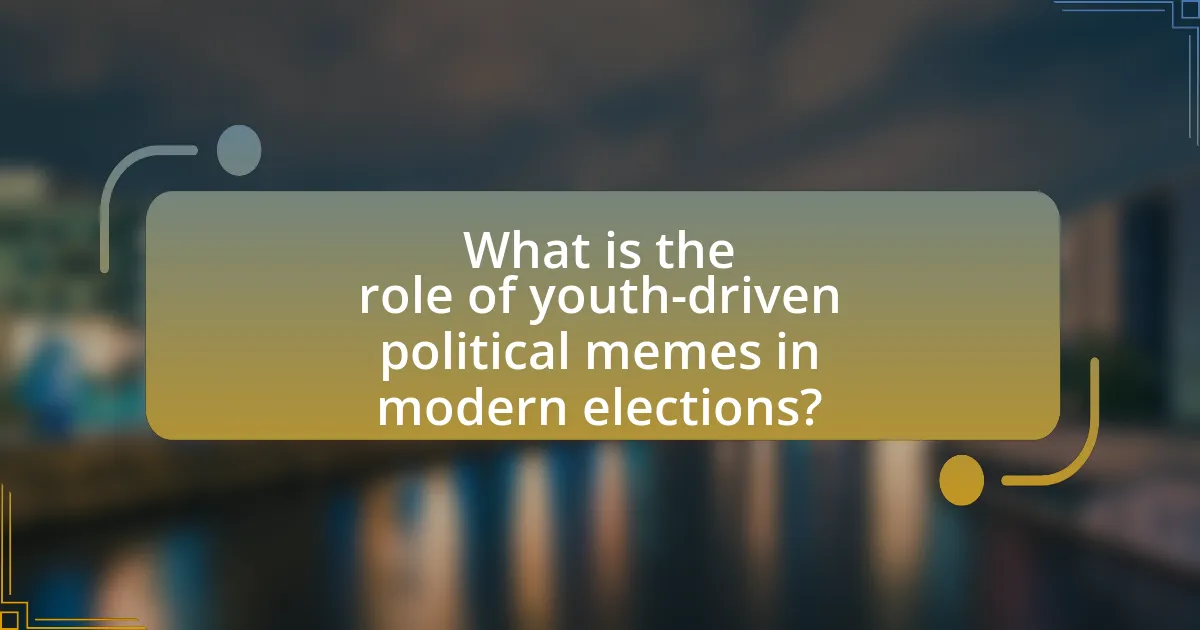
What is the role of youth-driven political memes in modern elections?
Youth-driven political memes play a significant role in modern elections by shaping political discourse and influencing voter engagement. These memes often simplify complex political issues, making them more accessible and relatable to younger audiences, which can lead to increased political awareness and participation. For instance, during the 2020 U.S. presidential election, platforms like TikTok and Instagram saw a surge in political meme content that resonated with younger voters, contributing to higher turnout rates among this demographic. Research indicates that memes can effectively convey political messages, mobilize support, and even sway opinions, as they are easily shareable and can go viral, amplifying their reach and impact.
How do political memes resonate with the youth demographic?
Political memes resonate with the youth demographic by effectively communicating complex political ideas in a relatable and humorous format. This demographic, which is highly engaged with social media platforms, often shares and interacts with memes that reflect their values and beliefs, thereby amplifying political messages. Research indicates that 55% of young voters reported being influenced by social media content, including memes, during elections (Pew Research Center, 2020). This engagement not only fosters political awareness but also encourages participation in the electoral process, as memes often serve as catalysts for discussions and mobilization efforts among youth.
What themes are commonly found in youth-driven political memes?
Common themes found in youth-driven political memes include social justice, climate change, and anti-establishment sentiments. These themes resonate with younger audiences who are increasingly engaged in activism and political discourse. For instance, a study by the Pew Research Center in 2020 indicated that 70% of young people prioritize social justice issues, which is often reflected in memes that highlight racial equality and LGBTQ+ rights. Additionally, memes addressing climate change frequently utilize humor and satire to convey urgency, appealing to the youth’s concern for environmental sustainability. Anti-establishment themes are also prevalent, as many memes critique traditional political structures and advocate for systemic change, reflecting a growing disillusionment with conventional politics among younger demographics.
How do these themes reflect the political concerns of young voters?
The themes of youth-driven political memes reflect the political concerns of young voters by highlighting issues such as climate change, social justice, and economic inequality. These themes resonate with young voters who prioritize progressive policies and seek to address systemic problems affecting their futures. For instance, a 2020 survey by the Institute of Politics at Harvard Kennedy School found that 63% of young voters identified climate change as a critical issue, demonstrating their demand for urgent action. Additionally, memes often serve as a tool for mobilization, enabling young voters to express their views and engage in political discourse, thereby amplifying their concerns in the electoral process.
Why are memes an effective medium for political communication?
Memes are an effective medium for political communication because they simplify complex ideas into easily digestible content that resonates with a broad audience. This simplification allows for rapid dissemination of political messages, particularly among younger demographics who are more engaged with visual and social media. Research indicates that memes can influence public opinion and voter behavior, as seen in the 2016 U.S. presidential election, where memes played a significant role in shaping narratives and mobilizing youth voters. The viral nature of memes enhances their reach, making them a powerful tool for political campaigns aiming to engage and inform constituents quickly and effectively.
What psychological factors make memes appealing to young audiences?
Memes appeal to young audiences primarily due to their relatability, humor, and social validation. Young individuals often seek content that resonates with their experiences and emotions, making memes an effective medium for expressing shared sentiments. The humor embedded in memes serves as a coping mechanism, allowing young audiences to navigate complex social and political issues in a lighthearted manner. Additionally, the social validation aspect of memes fosters a sense of community, as sharing and engaging with memes can enhance social connections among peers. Research indicates that humor and relatability are significant factors in content sharing, with studies showing that 78% of young people share memes to connect with friends and express their identity.
How do memes facilitate political engagement among youth?
Memes facilitate political engagement among youth by simplifying complex political issues into relatable and shareable content. This visual and humorous format captures attention and encourages discussions, making political topics more accessible. Research indicates that 55% of young people have engaged with political content through memes, highlighting their effectiveness in reaching and mobilizing this demographic. Additionally, memes often reflect current events and social movements, allowing youth to express their opinions and connect with like-minded individuals, thereby fostering a sense of community and activism.
What impact do youth-driven political memes have on voter behavior?
Youth-driven political memes significantly influence voter behavior by shaping political opinions and increasing engagement among younger demographics. These memes often simplify complex political issues, making them more relatable and shareable, which can lead to heightened awareness and discussion around specific candidates or policies. Research indicates that memes can enhance political participation; for instance, a study by the Pew Research Center found that 55% of young adults reported that social media influenced their political views. Additionally, memes can create a sense of community and belonging among like-minded individuals, further motivating them to vote.
How do memes influence political opinions and attitudes?
Memes significantly influence political opinions and attitudes by simplifying complex political messages into easily digestible content that resonates with audiences, particularly younger demographics. Research indicates that memes can shape perceptions by framing political issues in a humorous or relatable manner, which enhances engagement and shareability on social media platforms. For instance, a study published in the journal “Political Communication” by researchers at the University of Pennsylvania found that memes can alter viewers’ attitudes toward political candidates by emphasizing specific traits or narratives, thereby impacting voter behavior. This demonstrates that the viral nature of memes can effectively sway public opinion and mobilize political engagement among youth.
What evidence exists linking memes to changes in voter turnout?
Evidence linking memes to changes in voter turnout includes studies showing that memes can significantly influence political engagement among younger demographics. For instance, research conducted by the Pew Research Center in 2020 found that 55% of young voters reported being influenced by social media content, including memes, in their decision to participate in elections. Additionally, a study published in the Journal of Political Communication in 2021 demonstrated that memes that resonate with political sentiments can increase the likelihood of sharing information about voting, thereby enhancing voter turnout. These findings indicate a clear connection between the consumption of political memes and increased electoral participation among youth.
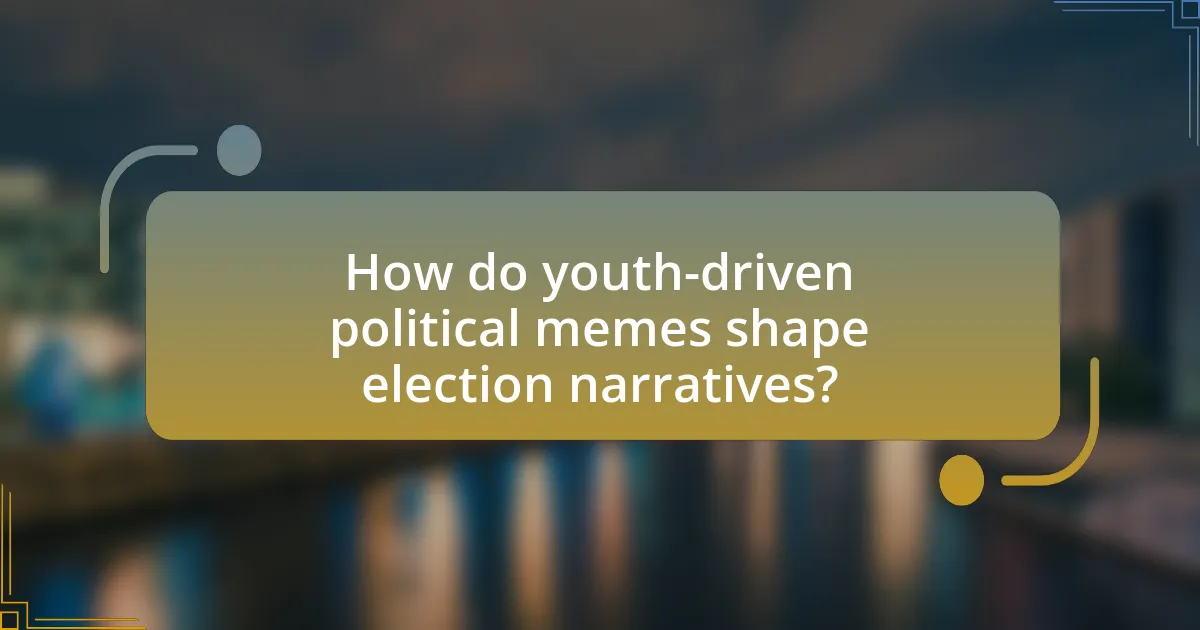
How do youth-driven political memes shape election narratives?
Youth-driven political memes significantly shape election narratives by influencing public perception and engagement among younger voters. These memes often simplify complex political issues into relatable and shareable content, making them more accessible to a digital audience. For instance, during the 2020 U.S. presidential election, memes addressing topics like climate change and social justice resonated with younger demographics, leading to increased voter mobilization and participation. Research indicates that memes can create a sense of community and urgency, prompting discussions that may not occur through traditional media channels. This phenomenon demonstrates how youth-driven memes can effectively frame political discourse and impact electoral outcomes.
What role do memes play in framing political issues during campaigns?
Memes play a significant role in framing political issues during campaigns by simplifying complex topics and making them more relatable to the electorate. They serve as a tool for rapid dissemination of political messages, often using humor or satire to engage younger audiences. Research indicates that memes can influence public perception and shape discourse by highlighting specific narratives or viewpoints, as seen in the 2016 U.S. presidential election where memes circulated widely on social media platforms, impacting voter opinions and engagement. This phenomenon underscores the power of memes in shaping political narratives and mobilizing youth participation in electoral processes.
How do memes contribute to the spread of misinformation?
Memes contribute to the spread of misinformation by simplifying complex issues into easily digestible and often misleading visuals or text. This simplification can distort facts, as memes frequently rely on humor or satire, which may lead audiences to accept false narratives without critical analysis. Research indicates that memes can spread rapidly across social media platforms, reaching large audiences quickly; for instance, a study published in the journal “Computers in Human Behavior” found that memes can significantly influence public opinion by reinforcing existing biases and misconceptions.
What strategies do political campaigns use to leverage memes?
Political campaigns leverage memes by creating relatable and shareable content that resonates with younger audiences. These campaigns often utilize humor, satire, and cultural references to engage voters, making complex political issues more accessible. For instance, during the 2020 U.S. presidential election, campaigns like that of Joe Biden effectively used memes on platforms like Instagram and TikTok to reach younger demographics, resulting in increased engagement and voter turnout. Research indicates that memes can significantly influence public opinion, as they are easily disseminated and can go viral, amplifying campaign messages rapidly across social media networks.
How do memes affect the perception of candidates?
Memes significantly shape the perception of candidates by simplifying complex political messages and making them more relatable to younger audiences. This simplification often leads to increased engagement and sharing on social media platforms, which amplifies the visibility of candidates’ traits, policies, or controversies. Research indicates that memes can influence voter opinions by framing candidates in a humorous or negative light, thereby affecting their public image. For instance, a study by the Pew Research Center found that 55% of young adults reported that memes influenced their views on political candidates during the 2020 election cycle. This demonstrates that memes serve as a powerful tool in shaping electoral perceptions and can ultimately impact election outcomes.
What characteristics of candidates are most often highlighted in memes?
Candidates in memes are often highlighted for their charisma, relatability, and perceived authenticity. Charisma is emphasized through visual humor and exaggerated expressions, making candidates appear more engaging. Relatability is showcased by depicting candidates in everyday situations or using language that resonates with younger audiences. Perceived authenticity is highlighted through memes that focus on candidates’ personal stories or genuine moments, contrasting them with political clichés. These characteristics are crucial as they influence how young voters perceive candidates, ultimately impacting election outcomes.
How do memes create or dismantle candidate reputations?
Memes create or dismantle candidate reputations by rapidly disseminating simplified narratives that resonate with audiences, often shaping public perception. For instance, memes can highlight a candidate’s strengths or weaknesses through humor or satire, making complex political issues more relatable and engaging. Research indicates that memes can significantly influence voter opinions; a study by the Pew Research Center found that 55% of young adults reported encountering political memes that affected their views on candidates during elections. This demonstrates that memes serve as powerful tools in shaping reputations, either bolstering support or undermining credibility based on the content and context of the memes shared.
What are the implications of meme culture on political discourse?
Meme culture significantly influences political discourse by shaping public opinion and facilitating the spread of political messages. Memes, often humorous and easily shareable, can simplify complex political issues, making them more accessible to a younger audience. For instance, during the 2016 U.S. presidential election, memes played a crucial role in mobilizing young voters, with studies indicating that 50% of young voters encountered political memes on social media platforms, which impacted their perceptions of candidates. This phenomenon demonstrates how memes can create viral narratives that resonate emotionally, often overshadowing traditional political communication methods.
How do memes challenge traditional media narratives?
Memes challenge traditional media narratives by providing alternative perspectives and facilitating rapid information dissemination among youth. Unlike traditional media, which often adheres to established editorial standards and gatekeeping, memes allow individuals to create and share content that reflects their viewpoints, often subverting mainstream narratives. For instance, during the 2016 U.S. presidential election, memes played a significant role in shaping public perception, as they often highlighted issues overlooked by traditional outlets, such as the experiences of marginalized communities. This phenomenon is supported by research from the Pew Research Center, which found that 55% of young adults reported getting news from social media, indicating a shift in how information is consumed and shared. Thus, memes serve as a powerful tool for youth to challenge and reshape the narratives presented by traditional media.
What are the potential risks of meme-driven political discourse?
Meme-driven political discourse poses several potential risks, including the spread of misinformation, polarization of opinions, and oversimplification of complex issues. Misinformation can proliferate rapidly through memes, as they often lack context and can misrepresent facts, leading to misguided beliefs among the audience. Research indicates that memes can contribute to political polarization by reinforcing existing biases, as individuals are more likely to share content that aligns with their views, creating echo chambers. Additionally, the oversimplification inherent in memes can reduce nuanced political discussions to simplistic slogans, hindering informed debate and critical thinking. These risks highlight the challenges of relying on memes as a primary source of political information.
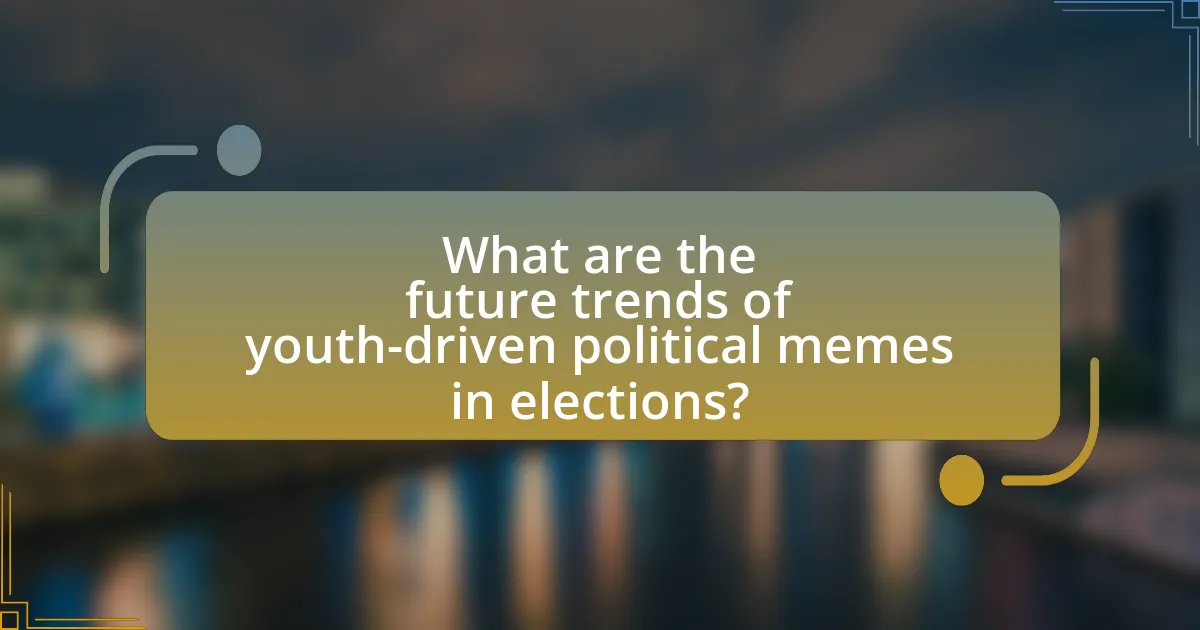
What are the future trends of youth-driven political memes in elections?
Future trends of youth-driven political memes in elections indicate an increasing reliance on digital platforms for political engagement and mobilization. As social media continues to dominate communication, youth are likely to create and share memes that simplify complex political issues, making them more accessible and relatable. This trend is supported by the rise of platforms like TikTok and Instagram, where short, impactful content can quickly go viral, influencing public opinion and voter turnout. Additionally, the use of humor and satire in these memes is expected to grow, as they resonate more with younger audiences, fostering a sense of community and activism. Research shows that memes can significantly impact political discourse, as evidenced by the 2020 U.S. elections, where youth engagement through memes played a crucial role in shaping narratives and mobilizing voters.
How is technology influencing the creation and spread of political memes?
Technology significantly influences the creation and spread of political memes by providing platforms for rapid dissemination and tools for easy content creation. Social media platforms like Twitter, Facebook, and Instagram enable users to share memes widely, reaching diverse audiences almost instantaneously. The accessibility of meme-generating applications allows individuals to create and modify content quickly, often reflecting current political events or sentiments. For instance, during the 2020 U.S. presidential election, memes played a crucial role in shaping public opinion, with studies indicating that memes can influence voter perceptions and engagement. This rapid spread and adaptability of political memes through technology have transformed them into powerful tools for political communication and mobilization among youth.
What platforms are most effective for meme dissemination among youth?
Social media platforms such as Instagram, TikTok, and Twitter are the most effective for meme dissemination among youth. These platforms facilitate rapid sharing and engagement, with TikTok’s algorithm promoting viral content and Instagram’s visual focus enhancing meme appeal. According to a 2021 study by the Pew Research Center, 71% of teens reported using Instagram, while 60% used TikTok, highlighting their popularity among younger demographics. Additionally, Twitter’s real-time interaction allows for immediate feedback and sharing, further amplifying meme reach.
How might emerging technologies change meme culture in politics?
Emerging technologies are likely to transform meme culture in politics by enhancing the speed and reach of meme dissemination. With advancements in artificial intelligence and machine learning, algorithms can analyze user preferences and trends, allowing for highly targeted political memes that resonate with specific demographics. For instance, platforms like TikTok and Instagram utilize sophisticated algorithms to promote viral content, which can amplify political messages rapidly among youth audiences. Additionally, the rise of deepfake technology may enable the creation of more engaging and persuasive political memes, although it also raises ethical concerns regarding misinformation. This shift in meme culture can significantly influence election outcomes, as seen in the 2016 U.S. presidential election, where memes played a crucial role in shaping public perception and voter engagement.
What strategies can political organizations adopt to engage youth through memes?
Political organizations can engage youth through memes by creating relatable, humorous, and shareable content that resonates with their values and interests. This strategy leverages the viral nature of memes, which are often shared across social media platforms, increasing visibility and engagement among younger demographics. For instance, a study by the Pew Research Center found that 69% of U.S. adults aged 18-29 use social media, making it a crucial avenue for outreach. Additionally, political organizations can collaborate with popular meme creators to ensure authenticity and relevance, as seen in campaigns that successfully utilized influencers to amplify their messages. By focusing on current events and cultural references that matter to youth, organizations can foster a sense of community and encourage political participation through humor and creativity.
How can campaigns create authentic and relatable meme content?
Campaigns can create authentic and relatable meme content by engaging directly with their target audience to understand their values, humor, and cultural references. This approach ensures that the memes resonate with the audience’s experiences and emotions, making them more likely to share and engage with the content. Research indicates that memes that reflect the audience’s everyday life and current events are more effective; for instance, a study by the Pew Research Center found that 55% of young adults share memes that they find relatable or humorous. By leveraging user-generated content and incorporating feedback from social media interactions, campaigns can further enhance the authenticity of their memes, ensuring they align with the audience’s sentiments and preferences.
What best practices should be followed to avoid backlash from meme usage?
To avoid backlash from meme usage, creators should ensure that their content is respectful, contextually relevant, and sensitive to diverse audiences. Respectful content avoids offensive stereotypes and derogatory language, which can alienate viewers and provoke negative reactions. Contextually relevant memes should align with current events and cultural sentiments, ensuring they resonate positively with the intended audience. Sensitivity to diverse audiences involves understanding the varied backgrounds and perspectives of viewers, which can prevent misunderstandings and backlash. Research indicates that memes that are inclusive and considerate of social issues tend to foster positive engagement rather than backlash, as seen in studies analyzing social media interactions during political campaigns.
What practical tips can youth utilize to create impactful political memes?
Youth can create impactful political memes by focusing on clarity, relatability, and emotional appeal. Clear messaging ensures that the meme’s core idea is easily understood, while relatability connects with the audience’s experiences or beliefs, making the content more shareable. Emotional appeal, such as humor or outrage, can drive engagement and prompt discussions.
For instance, memes that utilize popular culture references or current events can resonate more with youth, as evidenced by the viral success of memes during the 2020 U.S. presidential election, which significantly influenced voter engagement among younger demographics. Additionally, using high-quality visuals and concise text enhances the meme’s effectiveness, as studies show that visually appealing content is more likely to be shared on social media platforms.
